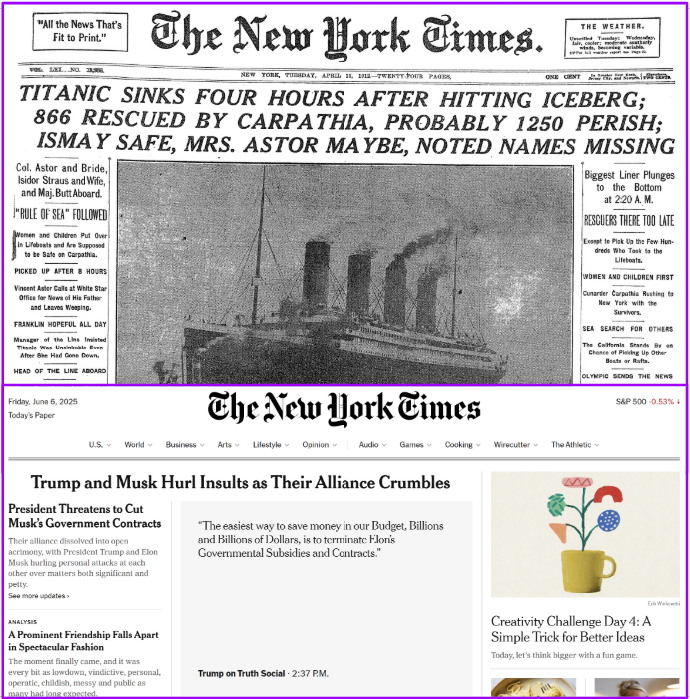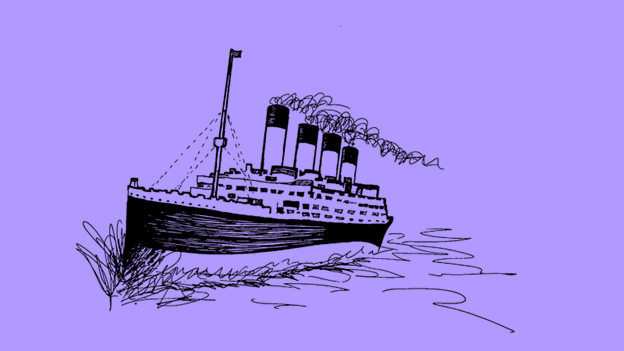What if we didn’t give these guys *all* our attention?

When the Titanic sank, the death of John Jacob Astor, the survival of his scandalously young new wife, and his son’s search for information were top news stories. Astor was one of the richest people in the world at the time. His net worth in 1912 would make him a billionaire in today’s dollars.
*
One of the first things I did this morning was check the front page of The New York Times. I sighed when I found exactly what I expected: eight of the first 11 clickable links on the NYT homepage led to stories about the long-anticipated Trump-Musk “feud,” “break-up,” “attacks” coming to a head.
Musk is not just a billionaire; like Astor was, he’s the richest man in the world. The best guess about Trump is that he’s also a billionaire (and Forbes points out that half his net worth has come in the last year, through his brazen use of the presidency as a money-making scheme).
It seems we’ve always been obsessed with billionaires.
That’s natural, I suppose. We humans are a curious species, and billionaires—especially these billionaires—can be curious creatures indeed.
But we’re losing the plot.
On the NYT homepage—the “newspaper of record” of the United States—I have to scroll to find information about the latest travel ban—the first round of which inspired protests at airports across the country in 2017 and the #DeleteUber campaign.
I have to scroll further to find a couple articles about the tax and budget boondoggle making its way through Congress—one on how the much-touted child tax credit increase won’t help the people who need it most; another on the millions who stand to lose their health care.
I scroll further still to find a couple articles about Israel’s latest atrocities at Gaza food aid sites and now, again, in Beirut. Russia’s early-morning attack on Kyiv is similarly buried.
Nothing until almost the very bottom—in the probably-no-one-will-read-this section crowded with other links—about our very dire climate situation, and the ways that that budget bill is poised to undermine the imperfect progress we’ve made on addressing it.
(And nowhere does it mention that today’s my mom’s birthday. Rude. Alles Gute zum Geburtstag to the best mama!)
By the way, it’s not just The New York Times. Fox News: “Elon Musk may speak to Trump aides in push to calm feud”; The Guardian: “Trump and Musk joust in astonishing social media duel.” Nor is it just U.S. media. Here in Germany, the Tagesschau homepage reports “Trump und Musk eskalieren ihren Streit.” (Trump and Musk escalate their dispute.)
And what’s not reported at all? The news that there are people—NGOs and lawyers, yes, but also everyday people like you and me—doing something about every single one of the once-in-a-generation emergencies we face and more.
A couple days ago, my writing group spent the first thirty minutes of our workshop talking about the state of all the things. One of my writer friends talked about how hopeful she feels having helped a friend win a race for school committee in her small town—a friend she recruited, whose longshot bid succeeded against the odds. Local electoral organizing is the way to go, she felt.
Her story, and the enthusiasm she radiated talking about it, reinforced my sense that there’s no one thing we should all be doing right now. That the most important thing is that we each get involved in whatever issue we care most about, using the skills we most like to use, in the venue that appeals most, and with people we like. Which is to say, for sure, local electoral organizing is great, if that’s your thing. But there are a lot of other things—things that don’t (just) involve doomscrolling through the reality-show horror of our billionaire-owned government—that can be your thing, and my thing, and anyone’s thing.
I’m just gonna leave this here one more time: a worksheet I created to help people figure out where they can best plug in to make change. It’s one of many tools out there, so maybe you find it helpful, maybe not.
The 1,500 people who died on the Titanic who were not Astors and Strausses mattered, and so do the many, many people impacted by our modern billionaires’ choices. And to be sure, a billionaires’ fight has tangible impacts for the rest of us, since their weapons of choice are policies that hurt people. But couldn’t these guys’ nasty tweets stand to capture just a bit less of our attention? And perhaps our agency to actually make people’s lives better deserves just a bit more?
June is officially Danny and my last month in Hamburg. Among other things, that means it’s time to start thinking about where I want to plug in and get active when I’m back in the States. So this weekend, in between tuning into episodes of Billionaire Feud, maybe I’ll take the worksheet for a spin. Wanna join me?
Love,
Ari
P.S. As always, I know some of you reading this are already involved in a bunch of cool ways. Won’t you please leave a comment letting me know what you’re up to? Xo.
What else?
- Okay, if you read one more hot take on the billionaire feud, let it be this one—on how Musk’s departure from Washington is in fact a people-powered victory.
- We really gotta stop the big bad budget bill. (Even MTG agrees now, maybe sorta partly?)
- Sign up for the No Kings day of action to be bigger and louder than Trump’s birthday military parade.
- The Global March to Gaza seems like a really beautiful and brave and important thing.

Member discussion